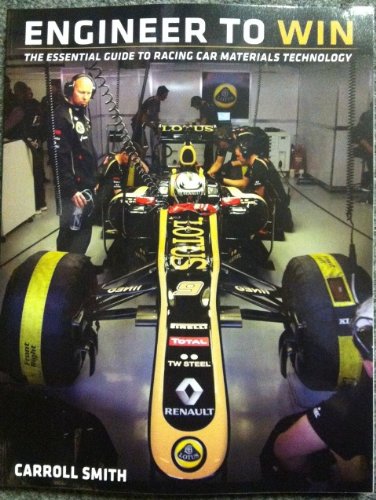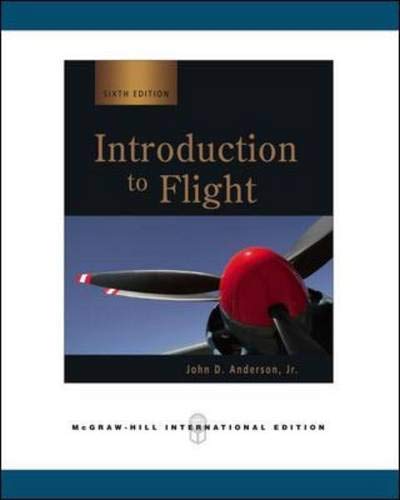(Part 2) Top products from r/AerospaceEngineering
We found 21 product mentions on r/AerospaceEngineering. We ranked the 41 resulting products by number of redditors who mentioned them. Here are the products ranked 21-40. You can also go back to the previous section.
21. Engineer to Win by Carroll Smith (2010) Paperback
Sentiment score: 1
Number of reviews: 1
 Show Reddit reviews
Show Reddit reviews22. ASUS VivoBook F510UA Thin and Lightweight 15.6” FHD WideView NanoEdge Laptop, Intel Core i5-7200U 2.5GHz, 8GB DDR4 RAM, 1TB HDD, USB Type-C, Fingerprint Reader, Windows 10 – F510UA-AH50
Sentiment score: 1
Number of reviews: 1
Powerful Intel Core i5 7200U 2.5GHz (Turbo up to 3.1GHz) processor14.2 Inches wide, 0.8 Inches thin and portable footprint with 0.3 Inches NanoEdge bezel for a stunning 80% screen to body ratio15.6 inches anti glare Full HD 1920x1080 WideView display with ASUS Splendid software enhancement8GB DDR4 R...
 Show Reddit reviews
Show Reddit reviews23. An Introduction to Theoretical and Computational Aerodynamics (Dover Books on Aeronautical Engineering)
Sentiment score: 1
Number of reviews: 1
 Show Reddit reviews
Show Reddit reviews26. Shigley's Mechanical Engineering Design (McGraw-Hill Series in Mechanical Engineering)
Sentiment score: 0
Number of reviews: 1
McGraw-Hill Science Engineering Math
 Show Reddit reviews
Show Reddit reviews27. LSC Space Propulsion Analysis and Design with Website
Sentiment score: 0
Number of reviews: 1
 Show Reddit reviews
Show Reddit reviews28. Introduction to Flight
Sentiment score: 1
Number of reviews: 1
McGraw-Hill Education
 Show Reddit reviews
Show Reddit reviews29. General Aviation Aircraft Design: Applied Methods and Procedures
Sentiment score: 0
Number of reviews: 1
 Show Reddit reviews
Show Reddit reviews30. Skunk Works: A Personal Memoir of My Years at Lockheed
Sentiment score: 1
Number of reviews: 1
Back Bay Books
 Show Reddit reviews
Show Reddit reviews33. Race Car Aerodynamics: Designing for Speed (Engineering and Performance)
Sentiment score: 1
Number of reviews: 1
Must have book on AerodynamicsJoe Katza2nd Edition
 Show Reddit reviews
Show Reddit reviews34. Helicopter Theory (Dover Books on Aeronautical Engineering)
Sentiment score: 0
Number of reviews: 1
 Show Reddit reviews
Show Reddit reviews35. Introduction to Structural Dynamics and Aeroelasticity (Cambridge Aerospace Series, Vol. 15)
Sentiment score: 0
Number of reviews: 1
 Show Reddit reviews
Show Reddit reviews36. Computational Gasdynamics
Sentiment score: 1
Number of reviews: 1
Used Book in Good Condition
 Show Reddit reviews
Show Reddit reviews37. A History of Aerodynamics: And Its Impact on Flying Machines (Cambridge Aerospace Series)
Sentiment score: 1
Number of reviews: 1
Used Book in Good Condition
 Show Reddit reviews
Show Reddit reviews38. Analysis of Aircraft Structures: An Introduction (Cambridge Aerospace Series)
Sentiment score: 1
Number of reviews: 1
Used Book in Good Condition
 Show Reddit reviews
Show Reddit reviews





They probably get cited too often as the best fluid mechanics books (at least for aerospace purposes), but John Anderson's books are a really good set to learn from as they have a really nice, linear progression of info. If you get several of them, you'll probably notice a fair bit of overlap in the early chapters since they're written to be pretty self-contained.
Jack Moran's book is also a really good intro and lead-up to computational approaches, with Laney providing a good second step down that line.
I third this. You may find that you learn more in FSAE than you will in class, especially regarding the realities of making designs come to life. It's hard work, but it will pay dividends for the rest of your life. (Just like the rest of college).
No need to restrict yourself to aerodynamics, that's only one of the many areas of study you'll learn in AE. Structures and controls are also core competencies of any respectable AE grad.
To half-answer your latter question, I found myself going down the structures route when my FSAE team needed a guy to do the chassis. I was originally enamored with aerodynamics, but to be honest, I'm quite glad that fate steered me to structures.
Because aerodynamics are so amenable to mathematical description (i.e., Navier-Stokes rules the show), the modern aerodynamicist is chiefly a mathematician. (Or some would say CFD-jockey, but that's perhaps a bit derogatory, haha). Rarely does he get to touch hardware.
Being a person who loves to split time between desk work and getting my hands dirty in the lab, I have found structures to be far more rewarding than other field options. There's still so much we don't understand about how materials fail, how to build stronger or stiffer composites, and how to predict failure, hat the structures engineer will always be kept busy pushing the boundaries of his field both experimentally and analytically. (I'm sure other fields are hard too, but of course I speak unabashedly from the structures perspective.)
As for books, a good place to start is the well-written series by the great Carroll Smith. Engineer to Win is a gem among the FSAE metal-pounders.
Has your friend read the book Skunk Works? I'd recommend it. If your friend likes building models, you can also run down to your local hobby shop and buy a plane or spacecraft kit to build one. Some may come pre-assembled if your friend isn't into building them.
That’s really sweet of you to do that for your boyfriend. Some universities have an “Intro to Aerospace Engineering” course where they use John Anderson’s Introduction to Flight textbook. It’s a really great read as it tries to sum up all of the field in one book while also being really enjoyable to read both actively and casually.
https://www.amazon.com/Introduction-Flight-John-Anderson-Jr/dp/0078027675/ref=mp_s_a_1_1?keywords=introduction+to+flight&qid=1563239666&s=gateway&sprefix=introduction+to+flight&sr=8-1
It’s a little pricey (approx $130, but that’s normal for engineering textbooks), but I think it’s worth it for what it provides at a base level for a fresh aerospace student.
I’d actually recommend “history of aerodynamic” also by John D. Anderson if you are reading for inspiration. It’s a fun read as he methodically step you step by step how aerodynamics as a science came to be. This is the same author that everyone is recommending, fundamentals of aerodynamics. I think history is better since it’s more of a story and have some maths in there to give you a taste without the undergrad level of calculus and differential equations that looks daunting and would be completely unfamiliar to you without the mathematical foundation you need.
Added link for ref: https://www.amazon.com/History-Aerodynamics-Machines-Cambridge-Aerospace/dp/0521669553
For flight dynamics, I've got Modern Flight Dynamics by Scmidt on my bookshelf. The book by Stengel looks pretty good too. I've got one of his other books called Optimal Control and Estimation that I like.
For structures of flight vehicles, I don't have any references I like on the subject unfortunately. The books I used for it in school were alright, but not great in my opinion. Lots of books on Amazon will let you have a preview, so you could skim a few there and then secure a copy from your library.
Skunk Works by Ben Rich - This book is probably one of the best reads in aerospace engineering. It tells the story of one of America’s premier aerospace research and development labs, Skunkworks at Lockheed Martin. They built such famous aircraft like the SR-71, U-2, F-80, F-114. I review the book here.
​
If you are looking for more of a textbook, Introduction to Flight by Anderson is one of the best. It's a bit on the expensive side but there's an international paperback edition that's much cheaper if you're outside of the US.
​
If you want something a bit between Skunkworks and Introduction to Flight, there's Ignition by John D. Clark which is all about the development of liquid rocket propellent.
I'm an aerospace engineering grad student studying solids/structures. My experience has been that at least our background courses like linear elasticity, beam theory, fatigue, fracture are all fundamental enough that they don't exclude any non-aero students. The more advanced courses like fracture mechanics are actually cross-listed with the civil department so we're all mixed in the same class. Research-wise for us, it's just the application happens to be aerospace so that dictates material choices, loading scenarios, etc. There are more specialized topics like aeroelasticity that you could look into books/courses for. I don't know what things would be like in industry but I think a structural engineering concentration within civil engineering will likely provide you with the fundamental knowledge of mechanics that you'd need for aerospace, too.
Book recommendation: Donaldson - Analysis of Aircraft Structures: An Introduction
Check to see if your university has a Formula SAE team. As an AE student you can help design and fabricate the airfoils of a Formula one car. Lightweight aeropackages with a low lift/drag ratio and a large downforce win races.
Race Car Aerodynamics: Designing for Speed (Engineering and Performance) https://www.amazon.com/dp/0837601428?ref=yo_pop_ma_swf
*edit: forgot to include link
This Laptop is the best one I was able to find. I use it with a Linux distribution and swapped the Hard drive for an SSD. Runs everything I need for physics and computer science.
General Aviation Aircraft Design by Gudmundson
Amazon
Also, check out Nicolai and Raymer. You might also find Jane's all world Aircraft catalog useful.
Everything you always wanted to know about Helicopters but were afraid to ask
Wayne Johnson is the Yoda of modern helicopter design.
https://www.amazon.com/Aeroelasticity-Dover-Books-Aeronautical-Engineering/dp/0486691896
​
I remember this book being a lot more accessible, although I don't know what I did with my copy:
https://www.amazon.com/Introduction-Structural-Aeroelasticity-Cambridge-Aerospace/dp/052119590X/ref=pd_lpo_sbs_14_t_2?_encoding=UTF8&psc=1&refRID=EJDCRK9829S53XTDERZV
How does Roark's compare to Shigley's?
Maybe not in the redesign but the old sidebar got the bibles:
Another great ressource is Nakka Rocketry webiste (http://www.nakka-rocketry.net/) for actual data.
Whatever you do please do not blindly follow popular youtube videos. At best they document decade old techniques that everyone has abandoned because they are unreliable, at worst plain dangerous.